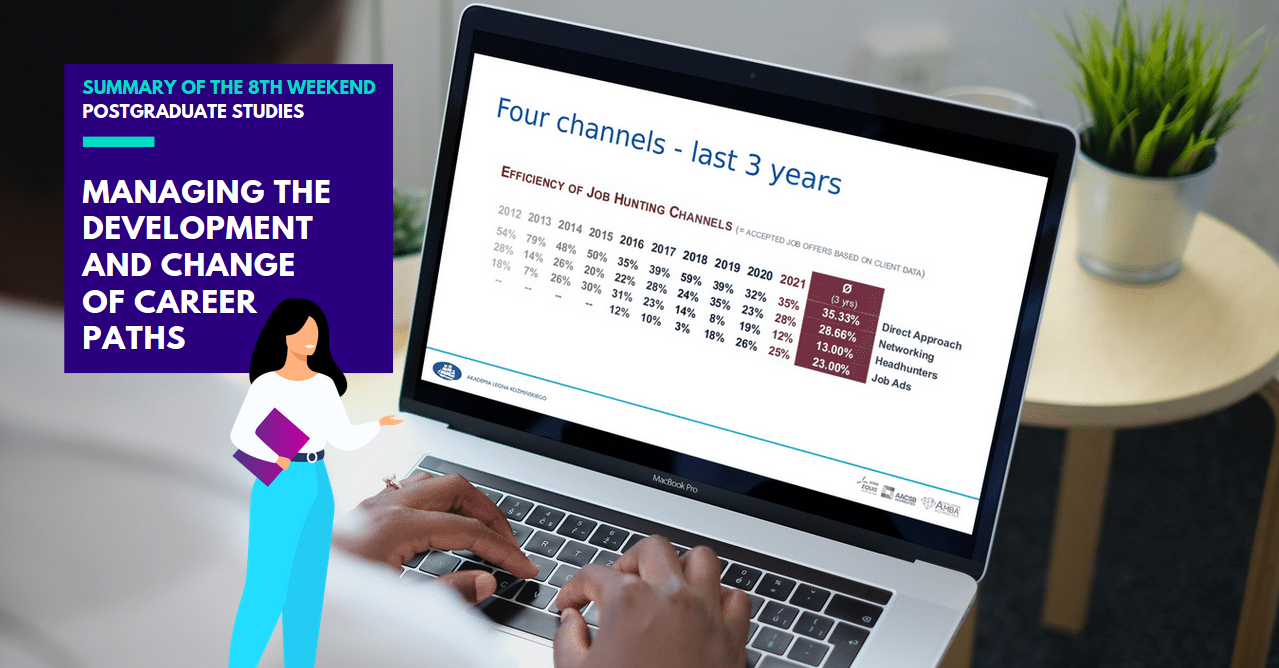
Career Advisory postgraduate studies – after the eighth weekend
“I’ve contacted 40 companies directly: 5 replied, and I spoke with 2 on the phone and on Skype. After 7 days, I sent a follow-up to those who had not responded. After another 3 days, I sent them invites on LinkedIn. Additionally, I contacted one alternative decision maker. The result: silence”. Career Consultants are often approached by frustrated candidates who are unaware of what they are doing wrong and why their search is unsuccessful. On top of that, candidates find their years of experience and age to be the reasons for their failures. The key to success lies in the strategy and the active use of modern job search channels: networking, contacting headhunters, and direct application. And that was the topic of the eighth weekend.
Job search channels, including networking, contacting headhunters and direct application
The first part of the eighth weekend was led by Sandra Bichl who focused on the topic of how to actively look for a job using channels such as direct contact, headhunters or job ads.
On the first day of the weekend, Sandra discussed the means and methods of creating a list of potential employers as the most effective job search channel for experienced candidates. The most important thing in preparing the list is to take into account the client’s goal and their target group. The formula of the weekend was very practical, as the students practised:
- ways of reaching a potential employer
- methods of identifying their target group
- finding a decision maker’s email address
- how to successfully contact a decision maker
- how to write an effective email to guarantee that your CV will be read and you will be invited to a job interview.
During that day, we hosted Konrad Zabłocki, HR Director, who discussed how recruitment processes look like behind the scenes and advised on what a candidate should do when they want to actively look for a job. Our guest also talked about where the so-called “ghosting” comes from.
The second day began with discussing the ways to reach headhunters, including the difference between an email to a headhunter and one to a potential employer. Sandra also discussed three common client cases:
-
“I contacted 40 companies directly. There are about 20 headhunters in my LinkedIn network, but I haven’t contacted any of them. As far as networking goes, I haven’t done anything”.
-
“In August I will be on holidays, and I will start looking for a job again in September. I have my ups and downs, and I’m afraid I may be too old to be a good candidate (I’m almost 50)”.
-
“I contacted 33 companies. So far, I have received 19 responses (follow-up emails were sent 10 days after the first email). 2 companies said they would contact me in the future as they currently did not have any suitable vacancies”.
Candidates are often frustrated, failing to achieve the desired results, and blame their failures on their age or being too experienced. However, these are not the real reasons behind these weak results – what is important is the strategy, the quality of the documents, but also the number of contacted people.
During the second part of the day, Sandra focused on the second most effective job search channel, networking. She presented ways of working effectively with clients, so that they could use their own network of contacts in a productive, strategic and elegant way to achieve their professional goal within their organization or on the market.
Additionally, she touched on the following aspects:
- how to establish an action plan with the client
- what to pay attention to when writing messages
- how to work with a client who is not willing to network for a variety of reasons, such as: lack of a network, small or hermetic industry, ego, or fear of rejection.
On the second day we also had the opportunity to host Łukasz Małecki, HR Specialist and Manager, and the Founder of ShareHire. Łukasz talked about the digitisation of referral programs, how such programs work (from the perspective of the employer and the candidate) and what benefits they can bring.
Reflections after the eighth weekend
“Thanks to the cases we’ve discussed, I realised that customer expectations are often unrealistic; I understood that it is important to show the client how the market works and make them aware that ghosting is a broader phenomenon and does not have to be taken personally”
“I liked the fact that I had an opportunity to see many practical examples of how to write a cover email”
“I gained a new, fresher perspective on the role of networking and I understood the importance of being systematic in building it, as it is a long-term process”
“I was very interested in the statistics on the various job search channels; I also liked the group work, and I appreciate the contributions of the special guests”
“The meetings were very substantive and I see that I will be able to use a lot of this knowledge in practice in my organisation”
“I saw that HR is measurable!”
“It was an intense and interesting weekend, and it certainly broadened my perspective. I was intrigued by market mechanisms and analytics, as well as the behaviour of headhunters. Thanks to the practical tips and cases, I understood how much work both the candidate and the advisor have to put in and how many different strategies are out there”
We will keep you informed about our students, as well as the progress of our studies.
PS. Read more about previous weekends:
– first
– second
– third
– fourth
– fifth
– sixth
– seventh
Are you interested in this field and don’t want to wait until our next edition?
Follow the information about our courses – including in-house – on this page:
https://careerangels.eu/pl/zostan-certyfikowanym-konsultantem-kariery/



